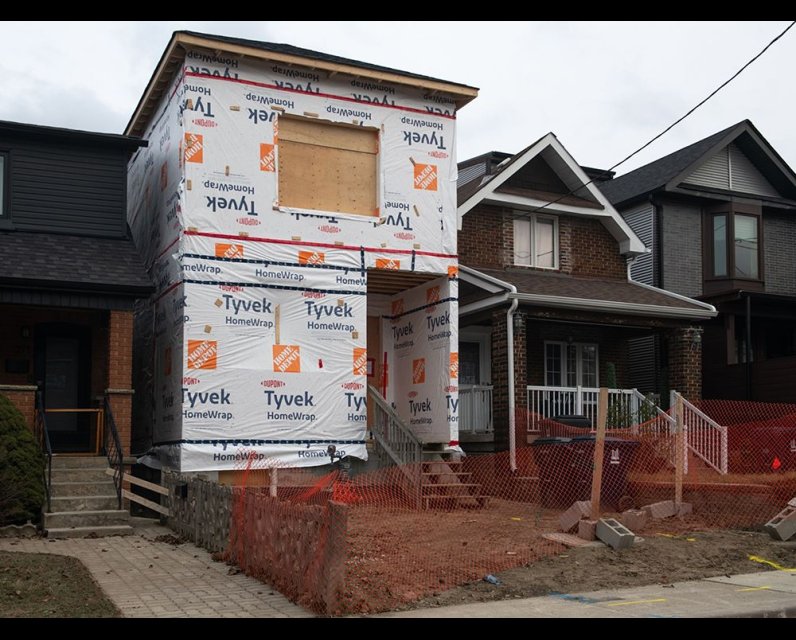Randall Denley: How to fix the housing affordability problem? Cut the sales tax

It would seem almost impossible to spend billions of dollars on Ontario’s housing problems without producing a positive result, yet Premier Doug Ford’s government is managing to do it.
The PC government has committed $5.2 billion to two major programs to speed up housing construction and increase supply, but the province’s housing situation is getting worse, not better.
The numbers are not good. A new RBC housing study shows that while most provinces have strong housing growth, Ontario’s six-month housing start average has fallen to the lowest level in a decade. The Canada Mortgage and Housing Corporation’s July data show a 25 per cent drop in housing starts in Ontario compared to last July. Every other province except B.C. has double-digit increases.
New home sales in the Toronto area are at the lowest levels since the 1990s . Slow sales volume has created a glut of housing in the market. Selling homes that are already built takes up to 20 months, about double what would happen in a healthy housing market.
Housing Minister Rob Flack isn’t disputing the size of the problem, saying this week that “Potential new home buyers have hit the pause button. We’ve seen the housing market come to a standstill.”
All that just might suggest that the province’s multi-billion-dollar spending isn’t having the desired effect, but instead of changing course, Ford doubled down last week by adding $1.6 billion to the now $4-billion Municipal Housing Infrastructure Program, which helps municipalities build roads, bridges and water infrastructure.
The idea is help build the infrastructure that will ultimately enable more housing, but it’s not a means to build houses faster or cheaper. Municipalities are happy to get the provincial money and want even more, but the program doesn’t compel them to cut the development charges that they would generally use to cover growth-related infrastructure costs.
The province’s other housing program, the $1.2-billion Building Faster Fund, is even more off the mark. It rewards municipalities that meet housing start targets set by the province. Toronto, where the province’s housing dysfunction is most extreme, recently received $67.2 million for adding to the city’s unsold housing glut. Only 23 of the 50 municipalities included met their provincial targets.
This program is built on the premise that municipalities control how many houses are built. They don’t. All they control is how many building permits are issued and how quickly that is done. The government has said it will adjust the program but not link it to building permits, making it effectively meaningless. There is no point in rewarding or punishing cities for things they can’t control.
The problem with both of Ontario’s programs is that they are aimed at increasing housing supply, which is useful in the long term, but the immediate issue is housing affordability, especially in the GTA. There is no use building houses that people are unable or unwilling to buy, given their high prices. The government’s programs are like someone turning up the water pressure without acknowledging the kink in the hose.
The most effective solution to high housing prices is painfully obvious, but neither the provincial nor federal government is willing to act. A new home priced at $1 million includes $130,000 in federal and provincial sales taxes. Buyers don’t see the charge because it’s embedded in the home price.
Both levels of government are willing to spend billions on what they hope will be housing solutions, but they are unwilling to stop taxing housing, ignoring the well-known wisdom that if you want less of something, tax it. It’s time to axe the tax.
For a brief moment, it looked as if Ford was willing to eliminate sales tax on new homes, if Prime Minister Mark Carney would do the same. Carney didn’t bite, then Ford took a step back, saying the provincial finance minister told him “It was a lot of money.”
Actually, a lot less than one might imagine, according to calculations by the Missing Middle Initiative and the Building Industry Land Development Association (BILD). The provincial government already gives a sales tax rebate of $24,000 and the federal government gives up to $6,300, but only for homes valued at less than $450,000. Carney has proposed to remove federal sales tax for first-time buyers.
A BILD report estimates that eliminating federal sales tax would save Ontario new home buyers $714 million annually and would have a cost of $2 billion nationally. The provincial government’s sales tax elimination would cost an additional $895 million a year.
Let’s imagine both governments did this for a two-year period. The temporary bargain would clean up the existing unsold housing backlog and spur new development while getting more people into homes.
That’s a big win at a modest price and an easy to understand political home run, as well. What’s the holdup?
National Post
Randall Denley is an Ottawa journalist. Contact him at randalldenley1@gmail.com


Comments
Be the first to comment